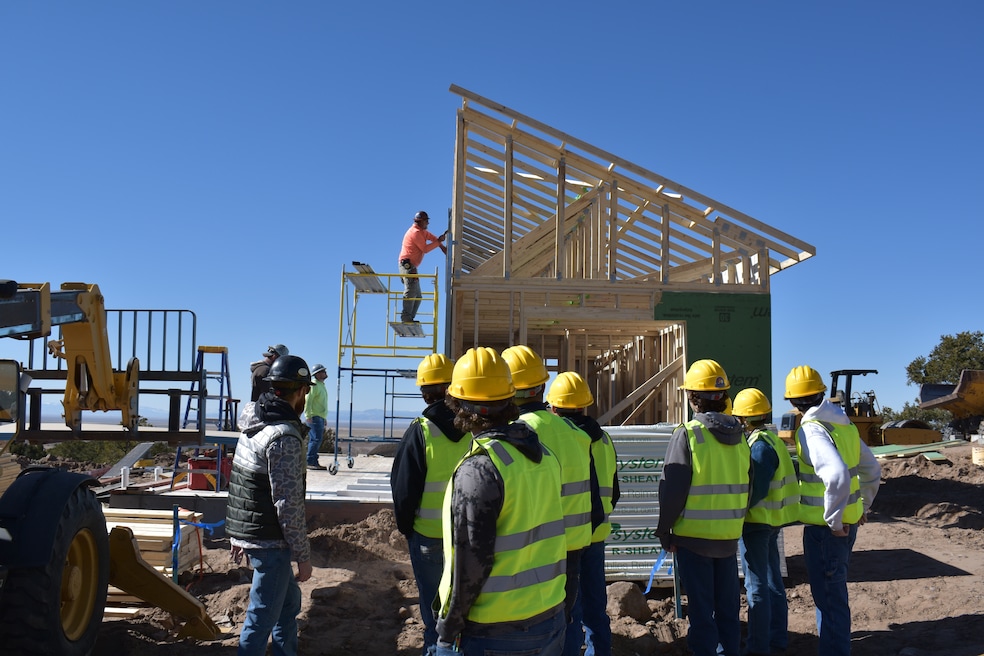Ten years in, a Colorado Springs initiative is bridging the gap between education and industry through hands-on learning and resources, at a time when the need for new workers in the construction trades is particularly acute.
There are 3.3 million residential construction workers on the payroll, which reflects a decrease of 26,100 jobs over the past year, according to a labor report from the National Association of Home Builders. The skilled labor shortage has cost the industry $10.8 billion, and about $8 billion of that is the loss of 19,000 new single-family homes, the NAHB says.
Renee Zentz, president of Careers in Construction Colorado, said the program offers students opportunities to learn about the industry and supports them as they transition into the workforce. The Housing and Building Association of Colorado Springs and Associated General Contractors of Colorado Springs initiated the program, known as CCIC, which enables students to learn 14 different skill sets, including HVAC, plumbing, electrical, carpentry and masonry.
“We wanted to get ahead of the game and actually caught lightning in a bottle" when it comes to helping students explore the depth of the breath of the industry, Zentz said. “If a student takes our classes, they will learn a lifelong skillset.”
Program had modest beginnings in Colorado Springs
Zentz said that the initial goal of the program was to gain admission to one Colorado Springs school.
Now, CCIC is in 91 across the state.
Zentz explained that while high school-age students mainly utilize the program, it begins in kindergarten.

She said the schools are responsible for educating and supporting students and teachers.
CICC funds the curriculum, certifications, materials, teacher stipends and career navigators. The navigators come from the industry and work directly with students to help them explore career paths by connecting them with guest speakers, field trips and job shadowing opportunities.
And the students' partnership with CICC doesn't end when they graduate, Zentz said. Navigators and others assist them with resumes, help them find jobs and support those who choose to further their education in the construction fields.
“We want them to know that they have a home base when they graduate … This is a lifelong relationship,” she said.
‘The magic is in the relationships’
Over the past 10 years, CICC has had approximately 16,000 students complete its program, with 2,500 of those students subsequently securing employment, according to Zentz.
Carson Magill is a junior at Florence Junior/Senior High School who joined the program to get an early start on his career. Magill is one of about 50 students at Florence taking CICC classes.
“I’ve enjoyed working with other students and learning more about the [construction] trade,” Magill said.

Zentz, who ran the Colorado Springs chapter of the National Association of Home Builders for 20 years, said one of the best aspects of her job at CICC is watching the students' progress. “I get to be in the [field] with the kids and listen to their stories ... and they're just a hoot,” she said. “The magic is in the relationships.”
Students can ‘start from scratch’
Magill said CICC offers valuable resources and experience.
“You can start from scratch and learn everything that you need to know from a lot of people that have lots of experience,” he said.
Thanks to CICC, Magill created a resume and landed an internship with True North Construction. He plans to join a construction crew after he graduates.
Building ‘a crew-type mentality’
The CCIC instructors are already teachers at the various schools that offer the program. Zentz said those educators go through a training program, and more than 100 teachers are participating.
Anthony Lozano, 46, an instructor and coach at Florence Junior/Senior High School, is one of them. Lozano has been running the school’s CICC program for three years. Originally from Florence, Lozano has been coaching football and basketball at the high school for almost 30 years, in addition to teaching.

Lozano said the program offers flexible training that allows instructors to mold it to their expertise and resources. Loranzo has a background in drywalling and as a general contractor.
For Lozano, too, the best aspect of teaching the students is spending time with them.
“You almost build a crew-type mentality and being able to watch them go from not being able to drive a nail in with a hammer ... to being able to give them a set of plans and being confident that they can go out and frame it … is pretty cool,” he said.
Lozano said the program is very hands on, as it allows students to learn different skills and witness firsthand what it’s like to work on a building project.
“Most of the guys that I have, they're wanting to just go to work,” Lozano said. “They get to figure out if they really like going out there when it's 10 degrees and working out in the weather, or maybe that's not something they want to do.”
Where unexpected paths lead
Although she’s been in the construction industry for a while, Zentz said her trade is horse training. She earned her degree from Colorado State University and began her career training horses and managing equestrian facilities. Through her work, she built strong relationships with builders and developers — many of whom were also ranchers and horse enthusiasts.
“I fell in love with the industry,” she said. “It's just the individuals and the people and the kindness.”

on-siteShe said her experience reflects how people can take unexpected paths to careers in the construction industry, and students can hear those stories. "Students can see, ‘Oh, my gosh, I don't have to have it figured out.'”
Aim for a national model
Zentz said the program hopes to be in 100 schools by 2028.
The larger goal is to create a toolkit, so it the program can be implemented nationwide, she said.
